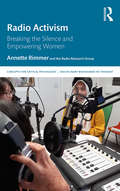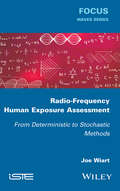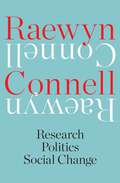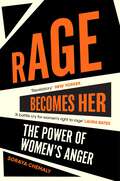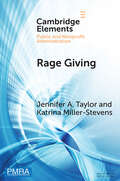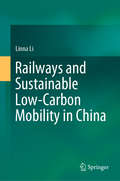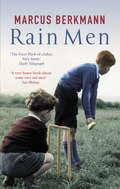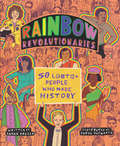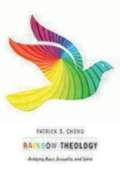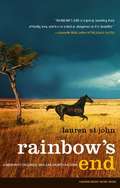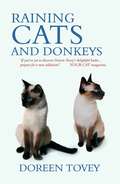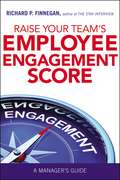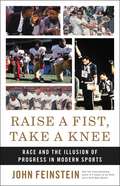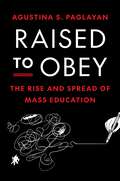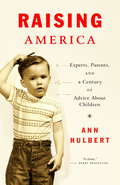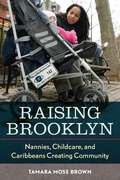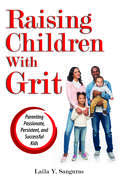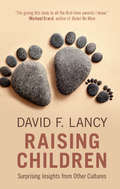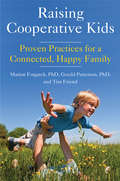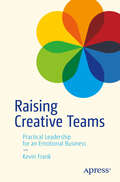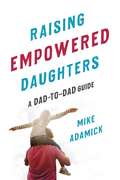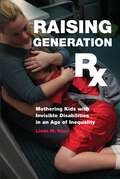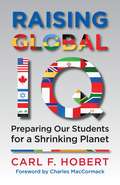- Table View
- List View
Radio Activism: Breaking the Silence and Empowering Women (Concepts for Critical Psychology)
by Annette RimmerThis unique book draws on the narratives of women participants in community radio, using intersectionality, feminist, critical psychological and community development frameworks to explore how this highly symbolic, creative dimension of activism can unmute marginalised women and enrich corporate media. Over a period of four years, twelve female radio project volunteers offer their experiences which they analyse, together as part of the RRG (Radio Research Group), alongside a conceptual and contextual framework to produce insights on the gendered nature of silence, voice and empowerment, and the wider potential of radio activism. Employing literature from a variety of fields, from bell hooks to Stuart Hall, the book foregrounds evidence from the majority world to argue the empowerment potential of community radio and the barriers to radio participation. Through this analysis community radio emerges as a site of development, from which diverse identities transpire through laughter, dialogue, raised consciousness and solidarity, but it also exposes the conflicts of empowerment by recognising inherent tensions in womanhood and in communities. Centering on the global, hegemonic challenge of empowering women, and relevant across multiple disciplines and professions, this is fascinating reading for academics, students and professionals in psychology, gender studies, media studies, development and related areas.
Radio-Frequency Human Exposure Assessment
by Joe WiartNowadays approximately 6 billion people use a mobile phone and they now take a central position within our daily lives. The 1990s saw a tremendous increase in the use of wireless systems and the democratization of this means of communication. To allow the communication of millions of phones, computers and, more recently, tablets to be connected, millions of access points and base station antennas have been extensively deployed. Small cells and the Internet of Things with the billions of connected objects will reinforce this trend. This growing use of wireless communications has been accompanied by a perception of risk to the public from exposure to radio frequency (RF) electromagnetic field (EMF). To address this concern, biomedical research has been conducted. It has also been important to develop and improve dosimetry methods and protocols that could be used to evaluate EMF exposure and check compliance with health limits. To achieve this, much effort has was made in the 1990s and 2000s. Experimental and numerical methods, including statistical methods, have been developed. This book provides an overview and description of the basic and advanced methods that have been developed for human RF exposure assessment. It covers experimental, numerical, deterministic and stochastic methods.
Raewyn Connell: Research, Politics, Social Change
by Raewyn ConnellPainters have their Retrospective Exhibitions, poets their Selected Poems, chess masters their Best Games, singers their Greatest Hits. But a researcher? It seems bold, even vainglorious, to present my Greatest Hits and Best Games. So much of social science is collaborative, so much depends on organisations, networks, shared ideas and shared excitement. This book is not an autobiography, but it is a collection of work by one researcher over forty years. I hope to show by example how intellectual projects can develop, how different lines of thought can meet and weave. The collection is arranged in five sections, concerned with class structure, gender relations, the making of masculinities, the social dimension of education, and the global economy of knowledge. It includes some of my best-known writing and allows me to raise questions about change. These fields all involve questions of social justice. When I started out, I assumed that accurate knowledge and good understanding would support action for social justice. Sometimes that assumption was battered - at other times I could be more optimistic. Choosing the articles wasn't easy. It wasn't a matter of picking favourites. I wanted texts that would say something relevant to readers now, and texts that would show the development of a field through time. Unexpectedly, that meant a tilt towards theory. I mostly do theoretical work close to empirical studies, whether fieldwork or archival; I try to think in the presence of the data, so to speak. So here it is. It may or may not be my Best Games or Greatest Hits, but it is the best collection of my work. I hope it will be useful to anyone interested in how ideas develop, how social science is built, and what directions we might take intellectual work in the near future.
Rage Becomes Her: The Power Of Women's Anger
by Soraya ChemalyA conversation-shifting book urging 21st-century women to understand their anger, embrace its power, and use it as a tool for positive change 'How many women cry when angry because we've held it in for so long? How many discover that anger turned inward is depression? Soraya Chemaly's Rage Becomes Her will be good for women. After all, women have a lot to be angry about.' GLORIA STEINEM Women are angry, and it isn't hard to figure out why. We are underpaid, overworked, thwarted and diminished. The assertive among us are labelled bitches, while the expressive among us are considered shrill. We are told to stand down when we have an opinion and to calm down when we are fired up. And when we somehow manage to put one high heel-battered foot in front of the other despite all of this, we're asked if it would kill us to smile. We are mad as hell, and that's completely okay. Because contrary to the endless barrage of self-help rhetoric about anger management and letting go, the reality is that our rage is the most important resource we have as women, a force for creation rather than destruction, our sharpest tool against both personal and political oppression. Anger is not what gets in our way, it is our way. All we need to do is own it. This is a pitch perfect, engaging, and accessible credo written by one of today’s most influential feminists. Analysing female anger as it relates to topics like self-worth, objectification, pain, care, fear, silence, and denial, Soraya illuminates how and why we repress our anger, revealing the harm that this causes, and helping us recognise the liberating power of owning our anger and marshalling it as a vital tool for positive change. Just as Quiet brought about a new embrace of introversion, Rage Becomes Her will bring about an embrace of feminine anger that will leave women feeling liberated, inspired and connected to an entire universe of women who are no longer interested in making nice.
Rage Giving (Elements in Public and Nonprofit Administration)
by Katrina Miller-Stevens Jennifer A. TaylorAfter the 2016 election upheaval and polarized public discourse in the United States and the rise of radical-right and populist parties across the globe, a new phenomenon in online charitable giving has emerged – donating motivated by rage. This Element defines this phenomenon, discusses its meaning amidst the current body of research and knowledge on emotions and charitable giving, the implications of viral fundraising and increased social media use by both donors and nonprofit organizations, the intersectionality of rage giving and its meaning for practitioners and nonprofit organizations, the understanding of giving as a form of civic engagement, and the exploration of philanthropy as a tool for social movements and social change. Previous research shows contextual variation in charitable giving motivations; however, giving motivated by feelings of anger and rage is an unstudied behavioral shift in online giving.
Railways and Sustainable Low-Carbon Mobility in China
by Linna LiThis book explores the role of railways in developing sustainable low-carbon mobility by analyzing the intermodal relationship between railways and other transport modes. Focusing on geographical and governance perspectives, and taking China as a case study, it analyzes the competition and cooperation between and integration of railways and other transport modes, in order to provide guidance on future sustainable transport development. Firstly, the book examines the contribution of railways to low carbon emissions in China over recent decades by estimating the carbon dioxide emissions from various transport modes in China at national and regional levels using decomposition analysis. It then discusses the current competition and cooperation between railways and other transport modes, as well as their integration and the impact of their relationship on climate change. It also highlights how the competition between railways and other transport modes may change the passenger flows between city pairs and so alter transport carbon emissions and examines how cooperation and integration could improve passengers’ travel experience while at the same time reducing carbon emissions. Lastly, it addresses the implications for future sustainable transport development based on institutional analysis. Presenting multidisciplinary, sustainable transport research on the role of railways in reducing carbon emissions, and also offering policy recommendations for developing low-carbon, integrated transport in the future, this book is a valuable reference resource for graduates, researchers, and government managers responsible for transport development, urban planning and environmental policy.
Rain Men
by Marcus BerkmannThere are many cricket books, and they are all the same. 'Don't Tell Goochie', autobiographical insights of nights on the tiles in Delhi with Lambie and the boys; 'Fruit cake days', a celebrated humourist recalls 'ball' - related banter of yore; and Wisden, a deadly weapon when combined with a thermos flask. Rain Men is different. Like the moment the genius of Richie Benaud first revealed itself to you, it is a cricketing epiphany, a landmark in the literature of the game.Shining the light meter of reason into cricket's incomparable madness, Marcus Berkmann illuminates all the obsessions and disappointments that the dedicated fan and pathologically hopeful clubman suffers year after year - the ritual humiliation of England's middle order, the partially-sighted umpires, the battling average that reads more like a shoe size. As satisfying as a perfectly timed cover drive, and rather easier to come by, Rain Men offers essential justification for anyone who has ever run a team-mate out on purpose or secretly blubbed at a video of Botham's Ashes.
Rain Men
by Marcus BerkmannThere are many cricket books, and they are all the same. 'Don't Tell Goochie', autobiographical insights of nights on the tiles in Delhi with Lambie and the boys; 'Fruit cake days', a celebrated humourist recalls 'ball' - related banter of yore; and Wisden, a deadly weapon when combined with a thermos flask. Rain Men is different. Like the moment the genius of Richie Benaud first revealed itself to you, it is a cricketing epiphany, a landmark in the literature of the game.Shining the light meter of reason into cricket's incomparable madness, Marcus Berkmann illuminates all the obsessions and disappointments that the dedicated fan and pathologically hopeful clubman suffers year after year - the ritual humiliation of England's middle order, the partially-sighted umpires, the battling average that reads more like a shoe size. As satisfying as a perfectly timed cover drive, and rather easier to come by, Rain Men offers essential justification for anyone who has ever run a team-mate out on purpose or secretly blubbed at a video of Botham's Ashes.
Rainbow Revolutionaries: Fifty LGBTQ+ People Who Made History
by Sarah Prager*A Junior Library Guild Selection* This groundbreaking, pop-culture-infused LGBTQ+ illustrated biography collection takes readers on an eye-opening journey through the lives of fifty influential queer figures who have made a mark on every century of human existence. Rainbow Revolutionaries brings to life the vibrant histories of fifty pioneering LGBTQ+ people from around the world. Through Sarah Prager’s (Queer, There, and Everywhere) short, engaging bios, and Sarah Papworth’s bold, dynamic art, readers can delve into the lives of Wen of Han, a Chinese emperor who loved his boyfriend as much as his people, Martine Rothblatt, a trans woman who’s helping engineer the robots of tomorrow, and so many more! This book is a celebration of the many ways these heroes have made a difference and will inspire young readers to make a difference, too. Featuring an introduction, map, timeline, and glossary, this must-have biography collection is the perfect read during Pride month and all year round. Biographies include: Adam Rippon, Alan L. Hart, Alan Turing, Albert Cashier, Alberto Santos-Dumont, Alexander the Great, Al-Hakam II, Alvin Ailey, Bayard Rustin, Benjamin Banneker, Billie Jean King, Chevalière d'Éon, Christina of Sweden, Christine Jorgensen, Cleve Jones, Ellen DeGeneres, Francisco Manicongo, Frida Kahlo, Frieda Belinfante, Georgina Beyer, Gilbert Baker, Glenn Burke, Greta Garbo, Harvey Milk, James Baldwin, Jóhanna Sigurðardóttir, José Sarria, Josephine Baker, Juana Inés de la Cruz, Julie d'Aubigny, Lili Elbe, Ma Rainey, Magnus Hirschfeld, Manvendra Singh Gohil, Marsha P. Johnson, Martine Rothblatt, Maryam Khatoon Molkara, Natalie Clifford Barney, Navtej Johar, Nzinga, Pauli Murray, Renée Richards, Rudolf Nureyev, Sally Ride, Simon Nkoli, Stormé DeLarverie, Sylvia Rivera, Tshepo Ricki Kgositau, Wen of Han, We’wha
Rainbow Theology: Bridging Race, Sexuality, And Spirit
by Patrick S. Cheng* The first book to explore the theologies of lesbian, gay, bisexual, and transgender (LGBT) people of color * Addresses issues of homophobia in communities of color, including ethnic churches, as well as racism in LGBT communities * Pioneering work on the global and local intersections of race, sexuality, and religion To date, no book has systematically examined the theological writings of LGBT people of color. Nor has any book explored how such writings might actually transform contemporary theological reflections on race and sexuality. This book remedies these gaps by constructing a rainbow theology around the theme of bridging or mediation. Rainbow Theology is the first book to reflect upon the theological significance of the intersections of race and queer sexuality across multiple ethnic and cultural groups. This is particularly important in light of the current polarizing debates over issues of race, sexuality, and religion within churches and communities of faith around the world.
Rainbow's End: A Memoir of Childhood, War and an African Farm
by Lauren St. JohnIn 1978, in the final, bloodiest phase of the Rhodesian civil war, eleven-year-old Lauren St. John moves with her family to Rainbow's End, a wild, beautiful farm and game reserve set on the banks of a slow flowing river.
Raining Cats and Donkeys
by Doreen ToveyLife is never a bed of roses for the Toveys and their beloved Siamese cats Solomon and Sheba. For one thing they've got Annabel the donkey to contend with! Filled with amusing anecdotes, 'Raining Cats and Donkeys' recalls the adventures and misadventures of the family and their adorable animals.
Raise Your Team's Employee Engagement Score: A Manager's Guide
by Richard P. FinneganWant employees that go the extra mile?Love them or hate them, employee engagement surveys are here to stay. As manager, you’re expected to digest the data and come up with a plan for improving the numbers. But it’s not just busy work. Raising engagement scores matters because engagement matters. An enthusiastic workforce translates into higher productivity and profitability with less turnover and absenteeism. Fully committed workers will give their all every day — and it’s your job to make that happen.Forget company picnics or employee-of-the-month awards. For real results, read Raise Your Team’s Employee Engagement Score. In this practical, research-based playbook, retention expert Richard Finnegan reveals how to:Build trust with your teamImplement stay interviewsDevelop an employee value propositionLeverage company engagement programsHire employees who self-motivateApply smarter, better metricsMeasure progress and forecast future engagementAnd moreBy following Finnegan’s techniques, you’ll send those engagement scores through the roof . . . and it won’t cost your company a dime.
Raise a Fist, Take a Knee: Race and the Illusion of Progress in Modern Sports
by John FeinsteinBased on dozens of shocking interviews with some of the most influential names in sports, this is the urgent and revelatory examination of racial inequality in professional athletics America has been waiting for.Commentators, coaches, and fans alike have long touted the diverse rosters of leagues like the NFL and MLB as sterling examples of a post-racial America. Yet decades after Tommie Smith and John Carlos raised their fists in a display of Black power and pride, and years after Colin Kaepernick shocked the world by kneeling for the national anthem, the role Black athletes and coaches are expected to perform—both on and off the field—still can be determined as much by stereotype and old-fashion ideology as ability and performance.Whether it&’s the pre-game moments of resistance, the lack of diversity among coaching and managerial staff, or the consistent undervaluation of Black quarterbacks, racial politics impact every aspect of every sport being played—yet the gigantic salaries and glitzy lifestyles of pro athletes often disguise the ugly truths of how minority players are treated and discarded by their White bosses. John Feinstein crisscrossed the country to secure personal interviews with quarterbacks, coaches, and more, revealing the stories none of us have heard (but all of us should know).Seventy-five years after Jackie Robinson broke baseball's color line, race is still a central and defining factor of America's professional sports leagues. With an encyclopedic knowledge of professional sports, and shrewd cultural criticism, bestselling and award-winning author John Feinstein uncovers not just why, but how, pro sports continue to perpetuate racial inequality. &“None of us are trying to make race an issue. Race IS an issue.&” (From the Foreword by Doug Williams)
Raised to Obey: The Rise and Spread of Mass Education (The Princeton Economic History of the Western World)
by Agustina PaglayanHow the expansion of primary education in the West emerged not from democratic ideals but from the state&’s desire to control its citizensNearly every country today has universal primary education. But why did governments in the West decide to provide education to all children in the first place? In Raised to Obey, Agustina Paglayan offers an unsettling answer. The introduction of broadly accessible primary education was not mainly a response to industrialization, or fueled by democratic ideals, or even aimed at eradicating illiteracy or improving skills. It was motivated instead by elites&’ fear of the masses—and the desire to turn the &“savage,&” &“unruly,&” and &“morally flawed&” children of the lower classes into well-behaved future citizens who would obey the state and its laws.Drawing on unparalleled evidence from two centuries of education provision in Europe and the Americas, and deploying rich data that capture the expansion of primary education and its characteristics, this sweeping book offers a political history of primary schools that is both broad and deep. Paglayan shows that governments invested in primary schools when internal threats heightened political elites&’ anxiety around mass violence and the breakdown of social order.Two hundred years later, the original objective of disciplining children remains at the core of how most public schools around the world operate. The future of education systems—and their ability to reduce poverty and inequality—hinges on our ability to understand and come to terms with this troubling history.
Raising America: Experts, Parents, and a Century of Advice About Children
by Ann HulbertHulbert uses biography and critical analysis to examine the personal dramas, scientific theories, and social visions of 20th-century child-rearing experts including L. Emmett Holt, G. Stanley Hall, and Benjamin Spock. Hulbert explores the political and social forces that influenced child-care experts, describes the shifting (and often confusing) formulas and dogmas of their ambitious quest to predict and perfect children's futures, and concludes that a hundred years of expert advice have failed to ease modern child-rearing anxieties. Hulbert is the author of Annotation. (c)2003 Book News, Inc., Portland, OR (booknews.com)
Raising Brooklyn: Nannies, Childcare, and Caribbeans Creating Community
by Tamara R. MoseStroll through any public park in Brooklyn on a weekday afternoon and you will see black women with white children at every turn. Many of these women are of Caribbean descent, and they have long been a crucial component of New York’s economy, providing childcare for white middle- and upper-middleclass families. Raising Brooklyn offers an in-depth look at the daily lives of these childcare providers, examining the important roles they play in the families whose children they help to raise. Tamara Mose Brown spent three years immersed in these Brooklyn communities: in public parks, public libraries, and living as a fellow resident among their employers, and her intimate tour of the public spaces of gentrified Brooklyn deepens our understanding of how these women use their collective lives to combat the isolation felt during the workday as a domestic worker.Though at first glance these childcare providers appear isolated and exploited—and this is the case for many—Mose Brown shows that their daily interactions in the social spaces they create allow their collective lives and cultural identities to flourish. Raising Brooklyn demonstrates how these daily interactions form a continuous expression of cultural preservation as a weapon against difficult working conditions, examining how this process unfolds through the use of cell phones, food sharing, and informal economic systems. Ultimately, Raising Brooklyn places the organization of domestic workers within the framework of a social justice movement, creating a dialogue between workers who don’t believe their exploitative work conditions will change and an organization whose members believe change can come about through public displays of solidarity.
Raising Cane: The World of Plantation Hawaii
by Ronald T. TakakiDiscusses the history of Asian plantation workers in Hawaii.
Raising Children With Grit: Parenting Passionate, Persistent, and Successful Kids
by Laila SangurasGrit, the combination of passion and perseverance, has more of an influence on success than cognitive ability, and parents want nothing more than to raise happy, successful children. Raising Children With Grit: Parenting Passionate, Persistent, and Successful Kids provides the strategies that parents need to teach, motivate, and inspire children to pursue their passions with grit—and succeed. By focusing on self-discipline, parenting strategies, and personality traits, parents can cultivate perseverance in their children. By coupling that with an emphasis on curiosity and interest-building activities, parents can help their children define their passions. Additionally, this book offers tips for parents about working with school personnel, how to model grit in their own lives, and how social factors can influence the development of grit.
Raising Children: Surprising Insights from Other Cultures
by David F. LancyWhy in some parts of the world do parents rarely play with their babies and never with toddlers? Why in some cultures are children not fully recognized as individuals until they are older? How are routine habits of etiquette and hygiene taught - or not - to children in other societies? Drawing on a lifetime's experience as an anthropologist, David F. Lancy takes us on a journey across the globe to show how children are raised differently in different cultures. Intriguing, and sometimes shocking, his discoveries demonstrate that our ideas about children are recent, untested, and often contrast starkly with those in other parts of the world. Lancy argues that we are, by historical standards, guilty of over-parenting, of micro-managing our children's lives. Challenging many of our accepted truths, his book will encourage parents to think differently about children, and by doing so to feel more relaxed about their own parenting skills.
Raising Cooperative Kids: Proven Practices for a Connected, Happy Family
by Marion Forgatch Gerald Patterson Tim FriendSecrets To Becoming The Very Best Parent You Can BeBe there for your children every step of the way and give them memorable experiences.What's the recipe for a happy family? It’s collaboration and communication. Instilling a spirit of cooperation in your children is the real secret to providing the gift of a happy childhood, being a "good" parent, and building the family you have always wanted.Perfect your parenting techniques. Research psychologists Marion Forgatch and Gerald Patterson have over 40 years of practice and tested clinical and prevention trials. Their Raising Cooperative Kids provides a universal and easy to use manual no matter where you live or how your family is structured. Discover the formula for overcoming family struggles and inspiring children to cooperate-from toddlerhood into their teens.Change unwanted behaviorsTeach your children new behaviorsReduce family conflictsSpecific guidance is included for issues ranging from how to share the bathroom during the morning rush to what to do when a child misbehaves. The authors also remind us of the importance of play-enjoying each other and sharing time and activities together is the cornerstone of a connected, happy family.If you enjoyed books like The Whole-Brain Child, What to Expect When You're Expecting, or The 7 Habits of Highly Effective Teens, then you’ll want to read Raising Cooperative Kids.
Raising Creative Teams: Practical Leadership for an Emotional Business
by Kevin FrankThere are a lot of books out there on how to be a creative professional. And a lot of schools where you can learn to be a creative professional. But let&’s say you find success on your chosen path, and they put you in charge of other creative professionals. Nobody tells you what to do then. Now they do. This book is a step-by-step guide to leading creative teams. You&’ll learn what a creative leader&’s job is (helping your team be more successful) and what it&’s not (telling people what to change about their work). How to have one-to-ones. What a one-to-one is in the first place. How to build creative culture. How to hire the right people. How to give feedback in a way that teams will listen. How to sell work. How to establish your creative vision. And most importantly, how to say thank you. What You Will Learn How to build relationships through one-to-ones How to create opportunities for team members to be successful How to build a culture that supports creativity How to build and manage teams How to give creative feedback How to sell work How to establish your creative vision and build your personal brand Who This Book is For New and aspiring leaders in creative fields such as advertising, design, production, and marketing, as well as experienced leaders looking to improve their skills.
Raising Empowered Daughters: A Dad-to-Dad Guide
by Mike AdamickA fists-up handbook for helping dads help their daughters resist the patriarchy, written by popular feminist dad blogger Mike AdamickAs a primary male role model in a girl's life, a father influences his daughter in profound ways, from the way she defines her female identity to what she expects from men. In Raising Empowered Daughters, Mike Adamick offers a wise and witty handbook for dads, suggesting ways to raise girls who won't settle for second-class-citizenship. Examining the extraordinary array of sexisms-both subtle and not-so-subtle-girls encounter, Adamick highlights not just the ways that girls and boys are treated differently but how the roles of moms and dads are shaped by society, too. Full of eye-opening anecdotes and dad-relatable humor, this is a necessary guide for every father who wants to raise a confident daughter.
Raising Generation Rx: Mothering Kids with Invisible Disabilities in an Age of Inequality
by Linda M. BlumWinner, 2016 Outstanding Publication in the Sociology of Disability, American Sociological Association, Section Disability and SocietyExamines the experiences of mothers coping with their children’s “invisible disabilities” in the face of daunting social, economic, and political realitiesRecent years have seen an explosion in the number of children diagnosed with “invisible disabilities” such as ADHD, mood and conduct disorders, and high-functioning autism spectrum disorders. Whether they are viewed as biological problems in brain wiring or as results of the increasing medicalization of childhood, the burden of dealing with the day-to-day trials and complex medical and educational decisions falls almost entirely on mothers. Yet few ask how these mothers make sense of their children’s troubles, and to what extent they feel responsibility or blame. Raising Generation Rx offers a groundbreaking study that situates mothers’ experiences within an age of neuroscientific breakthrough, a high-stakes knowledge-based economy, cutbacks in public services and decent jobs, and increased global competition and racialized class and gender inequality. Through in-depth interviews, observations of parents’ meetings, and analyses of popular advice, Linda Blum examines the experiences of diverse mothers coping with the challenges of their children’s “invisible disabilities” in the face of daunting social, economic, and political realities. She reveals how mothers in widely varied households learn to advocate for their children in the dense bureaucracies of the educational and medical systems; wrestle with anguishing decisions about the use of psychoactive medications; and live with the inescapable blame and stigma in their communities.
Raising Global IQ: Preparing Our Students for a Shrinking Planet
by Carl HobertA groundbreaking roadmap for improving global literacy and conflict-resolution skills in middle and high schools across the United States In Raising Global IQ, Carl Hobert calls on K-12 teachers, administrators, parents, and students alike to transform the educational system by giving students the tools they need to become responsible citizens in a shrinking, increasingly interdependent world. Drawing on his nearly thirty years teaching, developing curricula, and leading conflict-resolution workshops here and around the world, he offers creative, well-tested, and understandable pedagogical ideas to help improve our children's GIQ-- Global Intelligence Quotient. Cognizant of many U.S. schools' limited budgets and time, Hobert advocates teaching foreign languages early in life, honing students' conflict-resolution skills, providing creative-service learning opportunities, and offering cultural-exchange possibilities in students' own communities, as well as nationally and abroad--all before they graduate from high school.
